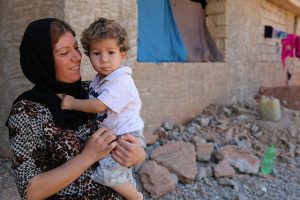Mosul
Couldn’t leave home this morning before finishing this article about Mosul by Rasha Al-Aqeedi.
 The message from the piece is that the ongoing battle may defeat ISIS but it can also make things much worse. The real question to answer is why did ISIS (whatever it is) walk into Fallujah, Ramady and Mosul in a matter of hours with little resistance while the coalition and the Iraqi government needs to destroy these towns to ‘liberate’ them?
The message from the piece is that the ongoing battle may defeat ISIS but it can also make things much worse. The real question to answer is why did ISIS (whatever it is) walk into Fallujah, Ramady and Mosul in a matter of hours with little resistance while the coalition and the Iraqi government needs to destroy these towns to ‘liberate’ them?
It can also not be ignored that this is happening at the same time as the destruction of Aleppo is being allowed to happen while the world just watches. A Fletcher student mentioned that three out of four of the headquarters of the Syria Civil Defense better known as The White Helmets have been hit, possibly deliberately targeted, since the truce collapsed. I urge you to also have a look at the documentary on the White Helmets, which is now on Netflix and think of the impact of all this on the next generation. The invisible hand of Fletcher was ever present in the background with members of our community working to help Syria Civil Defense achieve their goals over the summer.
This brings me back to the theme of this semester at the Fares Center: The lessons of the Iraq invasion and their impact on policy. Much of what we are seeing is not only a consequence of the Iraq invasion, it is also a consequence of some policies that are adopted because the received wisdom about the invasion and its aftermath as well the lessons that have been gleaned from it. This is as much about the U.S. and U.S. policy as it is about Iraq and the rest of the region – the Iraq war had a profound effect on how the U.S. perceives itself and its role in the world – it is possible that the people of Aleppo are paying the price of that this week as did the revolt against the regime in Syria. Wars have a profound and long term effect on societies and these extend well beyond the actual military operations, any student of Professor Leila Fawaz knows how the memory of war is held by ordinary people and carried over through several generations. In the run up to the elections, we hope it will be a useful exercise to discuss specifically the impact on policy and that this will spark many interesting conversations. The impact of Iraq and the lessons for a new administration have both been the subject of a Fares Center conference before and publications from them are on our website. We are adopting a new formula of spreading a theme over a whole semester. I personally participated in many panels in 2013 on the occasion of the 10th anniversary of the Iraq invasion and at Chatham House we produced anIraq Ten Years On report with contributions from various experts. It is no secret that I hold a ‘revisionist’ perspective on the subject and the book I would recommend for those who want to delve deeper into this reviews the impact of wars on culture in the US, France and Germany.
Watch out for our upcoming speakers: Fares Center Visiting Fellow Professor Karim Makdisi of the American University of Beirut who is also a Fletcher PhD graduate (October 19th) and Prof. Steven Heydemann of Smith College expert on Syria and on Authoritarian regimes (November30th). The semester started with the amazing Kim Ghattas speaking about Hillary Clinton, followed by events with political columnist Rami G. Khouri (October 3rd), Iraq War historian Col. Joel Rayburn (October 12th) and Harvard’s Roger Owen (October 17th). For me, the highlight of the semester was the two events we had led by Fletcher Students who have worked in the region talking about their experiences and trying to make sense of the bigger picture. These internal conversations are most enriching and we should have more of them benefiting from the extraordinary diversity of experience that exists within the Fletcher School’s faculty and student body.
The Fares Center will also be actively participating in the Middle East Studies Association annual meeting which is held this year in Boston. There is a panel on Iraq with three Tufts and Fletcher School PhD students and Fares Center doctoral fellows: Shahla al-Kli, Satgin Hamrah and Avner Golov, we are also having a discussion of the Fares Center’s Business History Program and a reception in the same meeting. I also look forward to participating in a panel on the Shi’a of Lebanon and to listening to the paper presented by Jean-Louis Romanet-Perroux and participating in the round table and panel he organized.
We are showing two films this semester film director Michal Goldman will be introducing her film Nasser’s Republic (October 26th) and we are setting the date for the screening of Little Ghandi also to be introduced by its director Sam Kadi.
(Photo courtesy of Flickr user @UNMigration)
